The Best 10 Alternatives to Webroot Business Endpoint Protection (+ Pricing & Reviews)
Twingate Team
•
Jul 27, 2024

Webroot Business Endpoint Protection offers advanced machine learning and cloud-based protection for network endpoints such as laptops, desktops, smartphones, tablets, servers, and virtual environments. While it provides robust security features, it might not be the choice for everyone. This article explores the benefits and limitations of endpoint protection solutions.
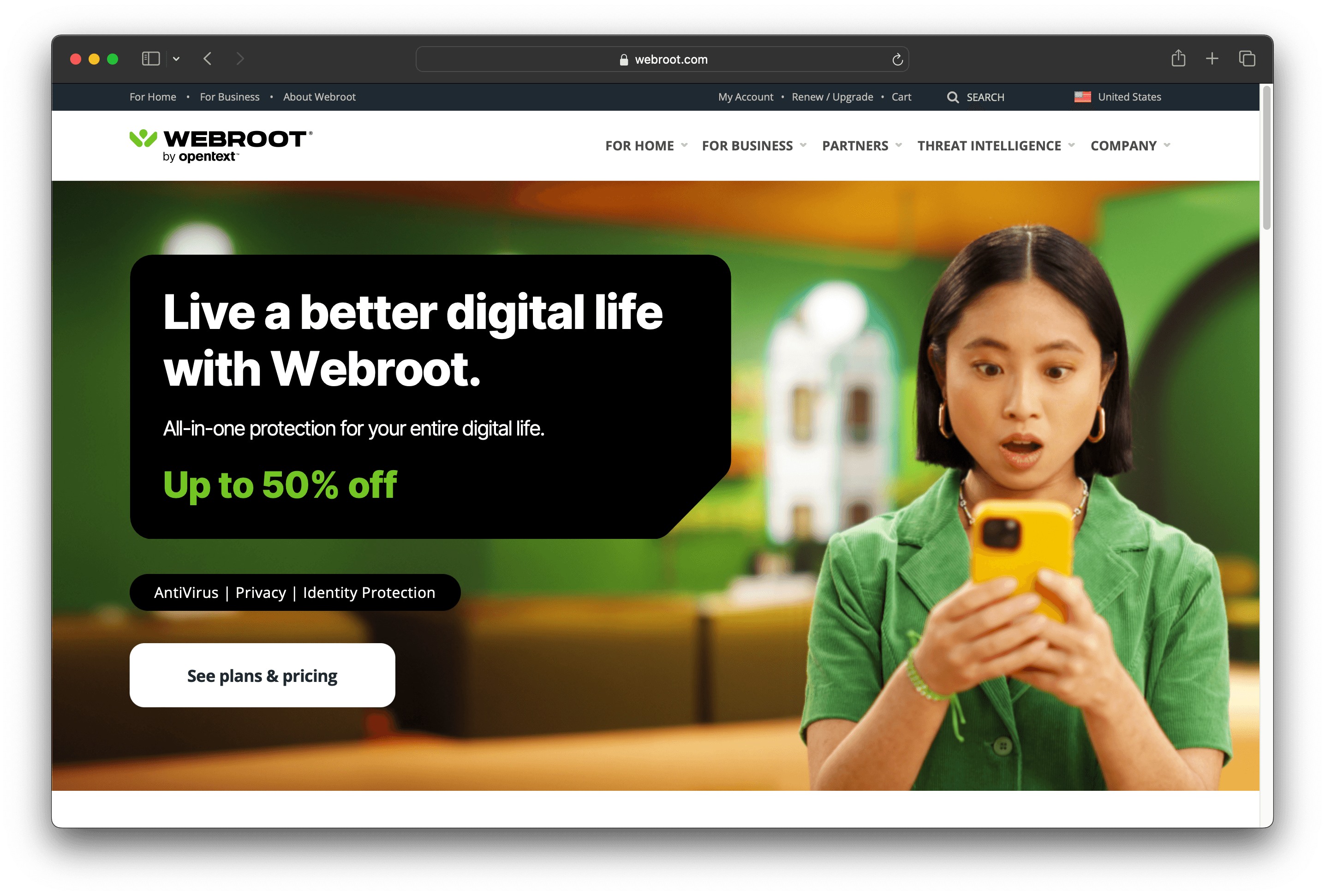
10 Alternatives to Webroot Business Endpoint Protection
1. Absolute Secure Endpoint
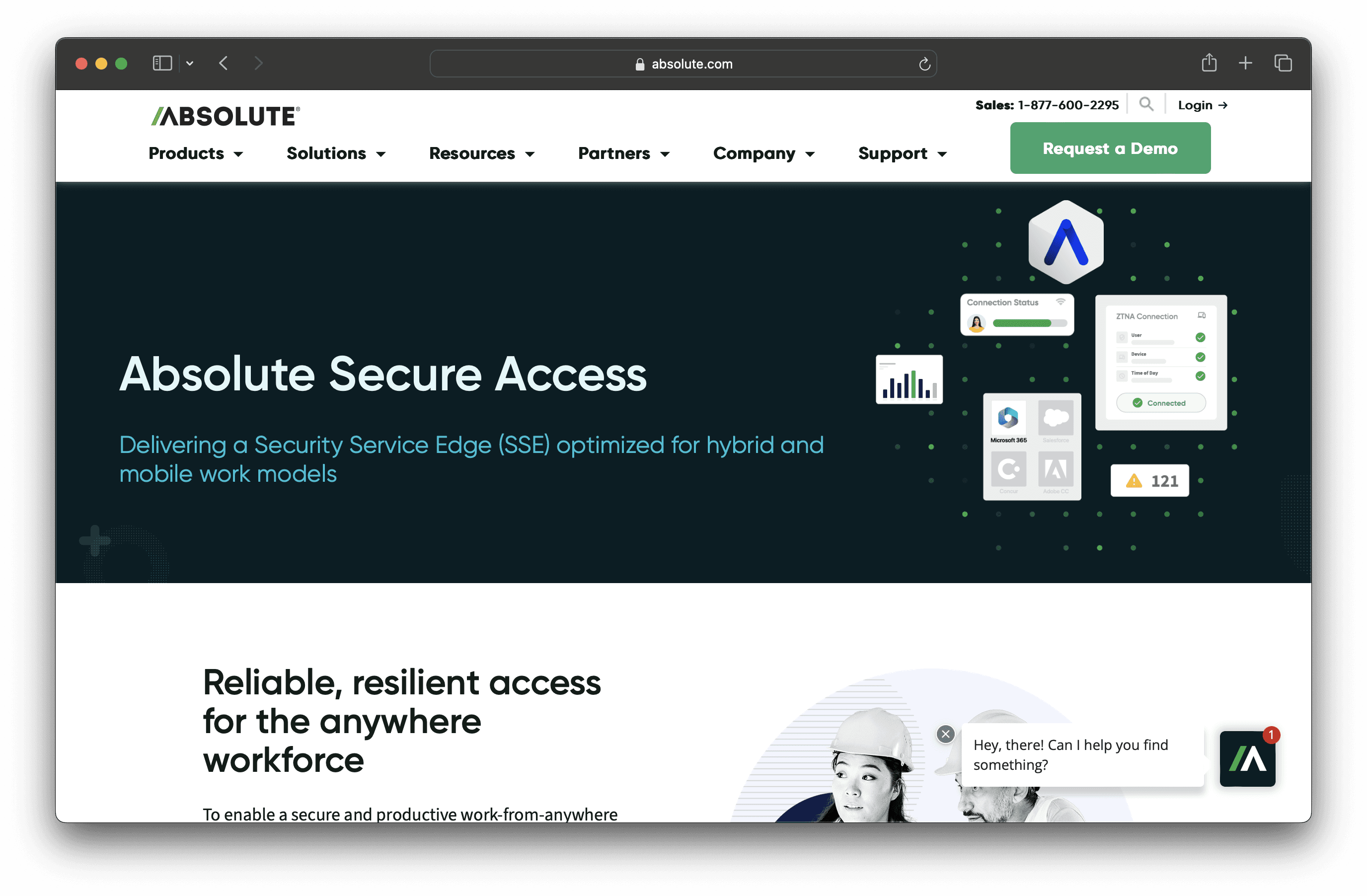
Absolute Secure Endpoint is a security solution designed to protect devices and data for modern, mobile workforces. It offers features like device health monitoring, application self-healing, and risk response, ensuring robust endpoint security and resilience against threats. This solution aims to provide comprehensive protection and maintain operational continuity.
Absolute Secure Endpoint Pricing
Absolute Visibility
Absolute Control
Absolute Resilience
Absolute Secure Endpoint's pricing is not public. Contact their support for more info.
Absolute Secure Endpoint Reviews
Absolute Secure Endpoint has an overall rating of 4.6 out of 5 stars based on 307 reviews. Users praise its ease of use and reliable tracking. Check out more of our reviews here!
Pros and Cons of Absolute Secure Endpoint
Pros:
Comprehensive device tracking allows IT teams to monitor hardware attributes, device leasing, and connection history, ensuring full visibility over the network.
Security posture assessment provides detailed reports on encryption status, anti-malware status, and device usage, enhancing overall security management.
Remote management capabilities enable administrators to freeze devices, delete data, and manage firmware protection, ensuring swift response to potential threats.
Cons:
OS support limitations mean some features are not available on all operating systems, such as Windows 11 SE and Apple M1-based Mac devices.
Advanced features like Application Health Reporting and Accelerated Device Actions are only accessible with higher-tier packages, potentially increasing costs.
Geographical limitations restrict certain services, like the service guarantee for stolen devices, to specific regions, limiting global applicability.
2. Hexnode UEM
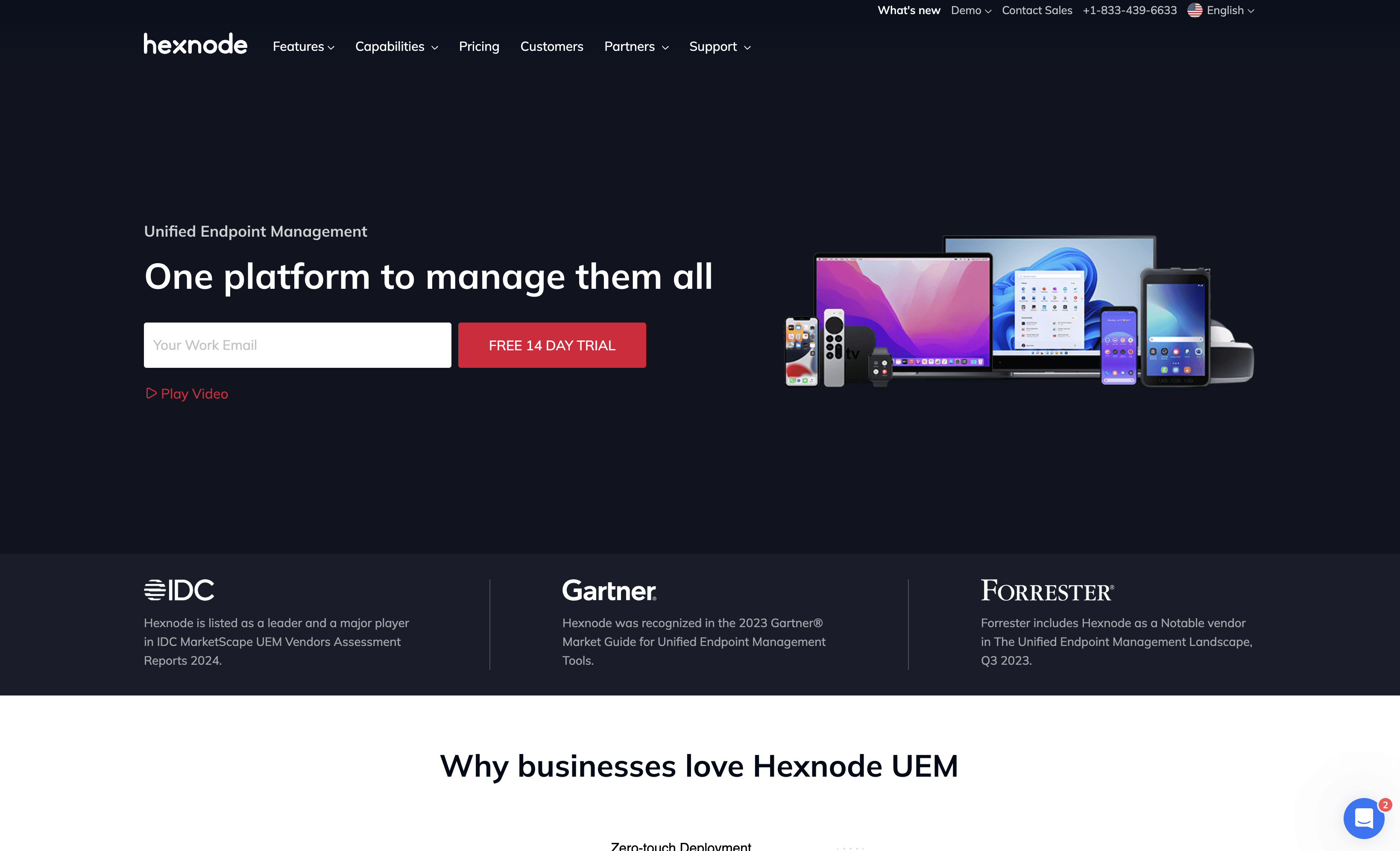
Hexnode UEM is a unified endpoint management solution designed to streamline device management and security for businesses. It offers features like device enrollment, policy enforcement, and remote control, making it easy to manage and secure a wide range of devices from a single platform.
Hexnode UEM Pricing
Starter: $1.00 per device/month
Pro: $1.80 per device/month
Enterprise: $2.70 per device/month
Ultimate: $3.60 per device/month
Hexnode UEM Reviews
Hexnode UEM has an overall rating of 4.6 out of 5 stars based on 189 reviews. Users appreciate its ease of use and multiplatform support. Check out more of our reviews here!
Pros and Cons ofHexnode UEM
Pros:
Comprehensive Device Management: Supports multiple platforms including Windows, macOS, Android, iOS, tvOS, and Fire OS.
Security Features: Includes enterprise-grade security policies, BitLocker management, password rules, and more.
Ease of Use: Intuitive interface simplifies device management and policy enforcement for IT teams.
Cons:
Missing Features: Some advanced features are not available, limiting functionality for certain use cases.
Device Management Issues: Occasional glitches in device enrollment and policy application.
Expensive: Higher-tier packages can be costly, especially for small businesses.
3. WatchGuard Endpoint Security
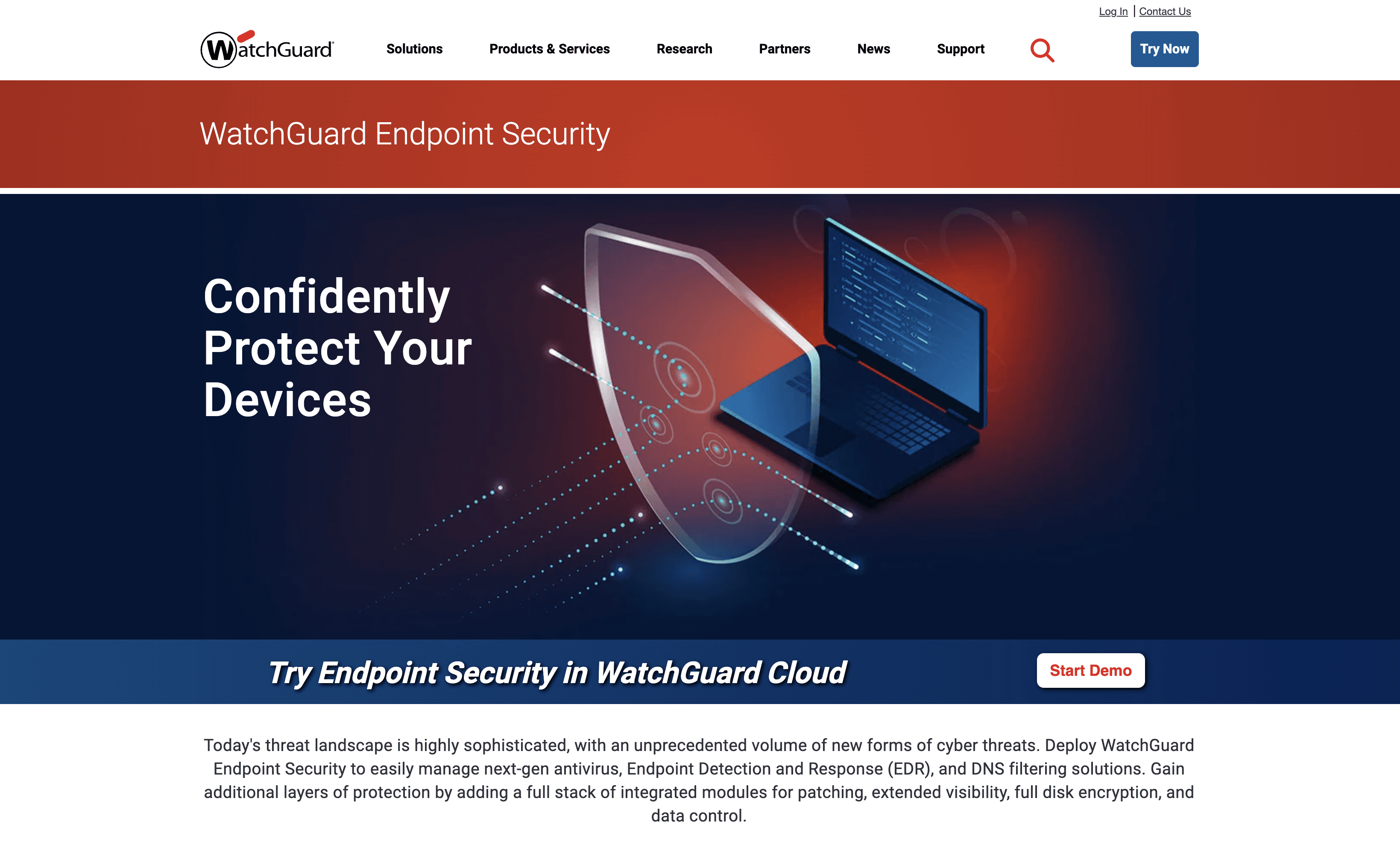
WatchGuard Endpoint Security is a comprehensive solution designed to protect devices against advanced cyber threats. It integrates next-gen antivirus, Endpoint Detection and Response (EDR), and DNS filtering into a unified platform. With cloud-based management, it simplifies security operations and enhances protection for businesses of all sizes.
WatchGuard Endpoint Security Pricing
WatchGuard Endpoint Security's pricing is not public. Contact their support for more info.
WatchGuard Endpoint Security Reviews
WatchGuard Endpoint Security has an overall rating of 4.4 out of 5 stars based on 115 reviews. Users appreciate its comprehensive protection and ease of use. Check out more of our reviews here!
Pros and Cons of WatchGuard Endpoint Security
Pros:
Comprehensive Protection: Integrates next-gen antivirus, EDR, and DNS filtering for robust defense against advanced threats.
Unified Security Platform: Centralized management and operational automation enhance visibility and streamline security operations.
Advanced Threat Detection: Effectively detects sophisticated threats like fileless malware, APTs, and ransomware.
Cons:
Complexity: The integrated platform may require a steep learning curve for new users.
Dependency on Cloud: Heavy reliance on cloud-based management can be limiting for organizations with strict data residency requirements.
Cost: Advanced features and comprehensive protection might come at a higher cost compared to simpler solutions.
4. F-Secure Elements
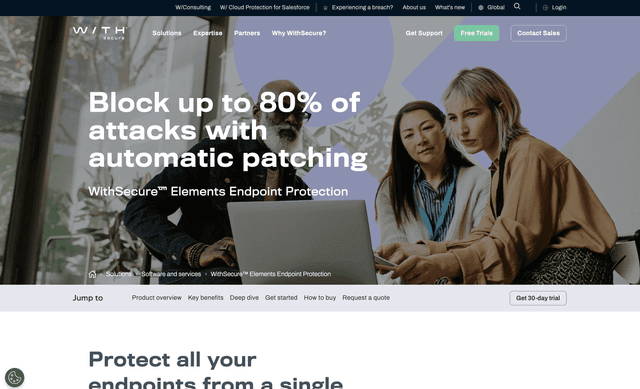
F-Secure Elements is a cloud-native, AI-powered endpoint protection solution designed to secure various devices, including computers, servers, and mobile devices. It offers automated patch management, multi-engine malware protection, and cloud-based threat analysis, ensuring comprehensive security with minimal management overhead.
F-Secure Elements Pricing
F-Secure Elements's pricing is not public. Contact their support for more info.
F-Secure Elements Reviews
F-Secure Elements has an overall rating of 4.4 out of 5 stars based on 17 reviews. Users appreciate its effective threat detection and user-friendly interface. Check out more of our reviews here!
Pros and Cons of F-Secure Elements
Pros:
Automated Patch Management: Blocks up to 80% of ransomware attacks, reducing vulnerability.
Cloud-based Threat Analysis: Provides advanced detection and analysis, enhancing security.
Multi-engine Malware Protection: Offers robust defense against various malware types.
Cons:
Complex Interface: May be challenging for new users to navigate and utilize effectively.
Premium Features: Advanced options like DataGuard and Endpoint Encryption require additional costs.
Dependence on Cloud: Requires a reliable internet connection for optimal performance.
5. Sophos Intercept X Endpoint Protection
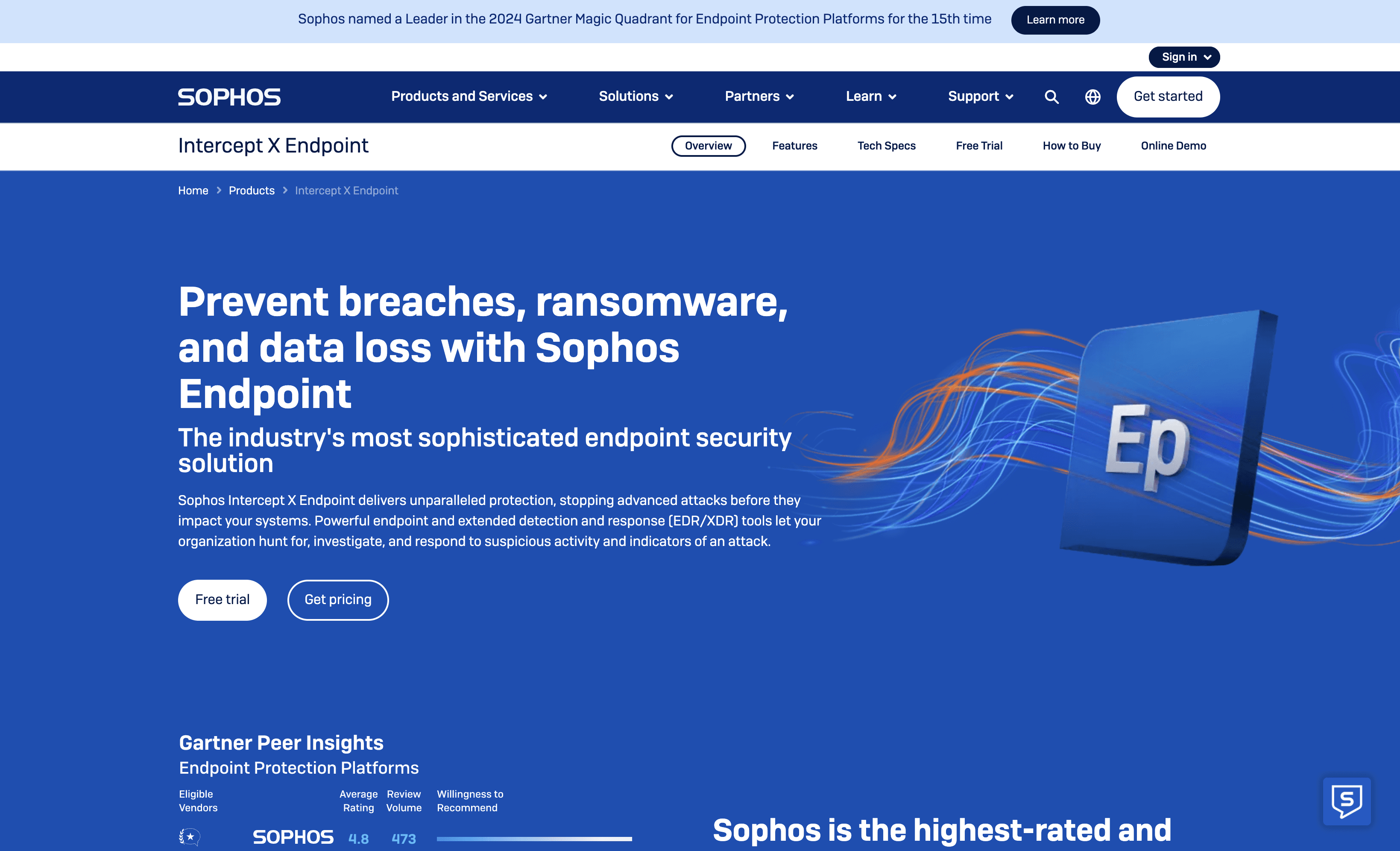
Sophos Intercept X Endpoint Protection is a security solution designed to prevent breaches, ransomware, and data loss. It combines advanced threat detection with easy deployment and management through a cloud-based platform. Ideal for businesses of all sizes, it offers robust protection with minimal setup and maintenance.
Sophos Intercept X Endpoint Protection Pricing
Advanced
Advanced with XDR
Advanced with MDR Complete
Sophos Intercept X Endpoint Protection's pricing is not public. Contact their support for more info.
Sophos Intercept X Endpoint Protection Reviews
Sophos Intercept X Endpoint Protection has an overall rating of 3.9 out of 5 stars based on 30 reviews. Users appreciate its effectiveness against ransomware and ease of use. Check out more of our reviews here!
Pros and Cons of Sophos Intercept X Endpoint Protection
Pros:
Comprehensive Security: Uses AI, behavioral analysis, and anti-ransomware technologies for robust protection.
Ease of Use: Users find it easy to install and navigate, simplifying management.
Effective Against Ransomware: CryptoGuard technology provides real-time protection and automatic rollback of affected files.
Cons:
False Positives: Occasionally flags legitimate applications, causing unnecessary alerts.
Resource Intensive: AI and behavioral analysis can impact performance on older devices.
Learning Curve: Advanced features may require time to master for new administrators.
6. Eset Endpoint Protection Advanced
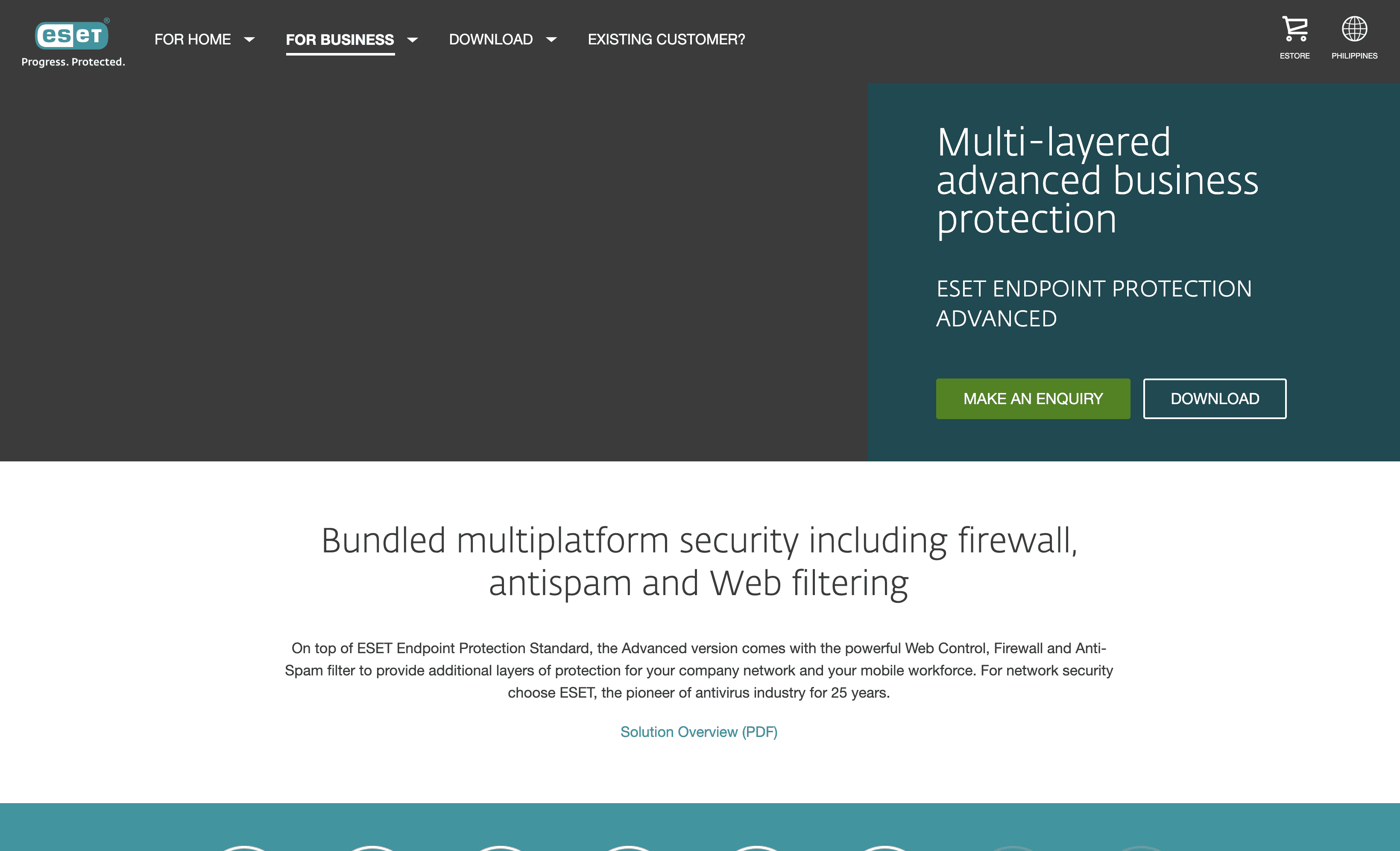
Eset Endpoint Protection Advanced is a multi-layered security solution designed to protect business networks. It includes features like firewall, antispam, and web filtering, ensuring comprehensive protection for endpoints. With easy deployment and centralized management, it offers robust security for both physical and virtual environments.
Eset Endpoint Protection Advanced Pricing
ESET Endpoint Protection Advanced's pricing is not public. Contact their support for more info.
Eset Endpoint Protection Advanced Reviews
Eset Endpoint Protection Advanced has an overall rating of 4.6 out of 5 stars based on 814 reviews. Users appreciate its high security and ease of use. Check out more of our reviews here!
Pros and Cons of Eset Endpoint Protection Advanced
Pros:
Multi-layered security including firewall, antispam, and web filtering ensures comprehensive protection against diverse threats.
Real-time protection for mobile devices (Android and iOS) enhances security for on-the-go employees.
Centralized remote management simplifies oversight and control of various endpoints from a single platform.
Cons:
Some users report a steep learning curve, making it challenging for new administrators to master advanced features.
Compatibility issues with certain operating systems can limit the effectiveness of the solution in diverse IT environments.
Performance may slow down on older devices, impacting overall user experience and productivity.
7. Threatlocker
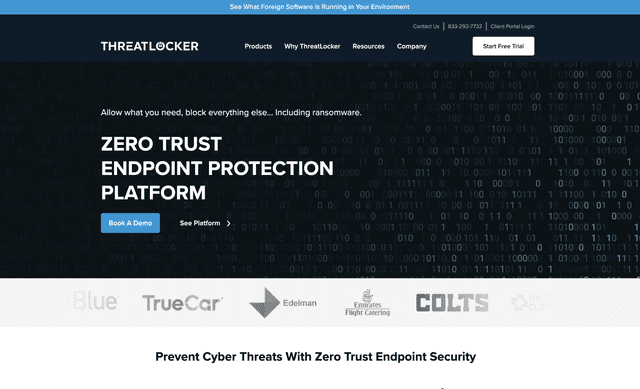
ThreatLocker is a cybersecurity solution focused on Zero Trust endpoint protection. It allows only necessary software to run, blocking everything else, including ransomware. With features like Allowlisting, Ringfencing™, and Network Control, ThreatLocker aims to provide robust security while being easy to manage and deploy.
Threatlocker Pricing
Threatlocker's pricing is not public. Contact their support for more info.
Threatlocker Reviews
Threatlocker has an overall rating of 4.8 out of 5 stars based on 162 reviews. Users appreciate its ease of use and strong security features. Check out more of our reviews here!
Pros and Cons of Threatlocker
Pros:
Zero Trust Security: Blocks all applications and scripts except those explicitly allowed, ensuring robust endpoint protection.
Comprehensive Features: Includes Allowlisting, Ringfencing™, Network Control, and more, offering a wide range of security tools.
24/7 Support: The Cyber Hero Team provides round-the-clock technical support, ensuring quick resolution of issues.
Cons:
Complexity: The platform's extensive features can be overwhelming for smaller organizations or those without dedicated IT staff.
Cost: Enterprise-level solutions like ThreatLocker often come with a higher price tag, which might be a barrier for smaller businesses.
Learning Curve: Implementing a Zero Trust model and utilizing all features effectively may require significant time and training.
8. Forticlient
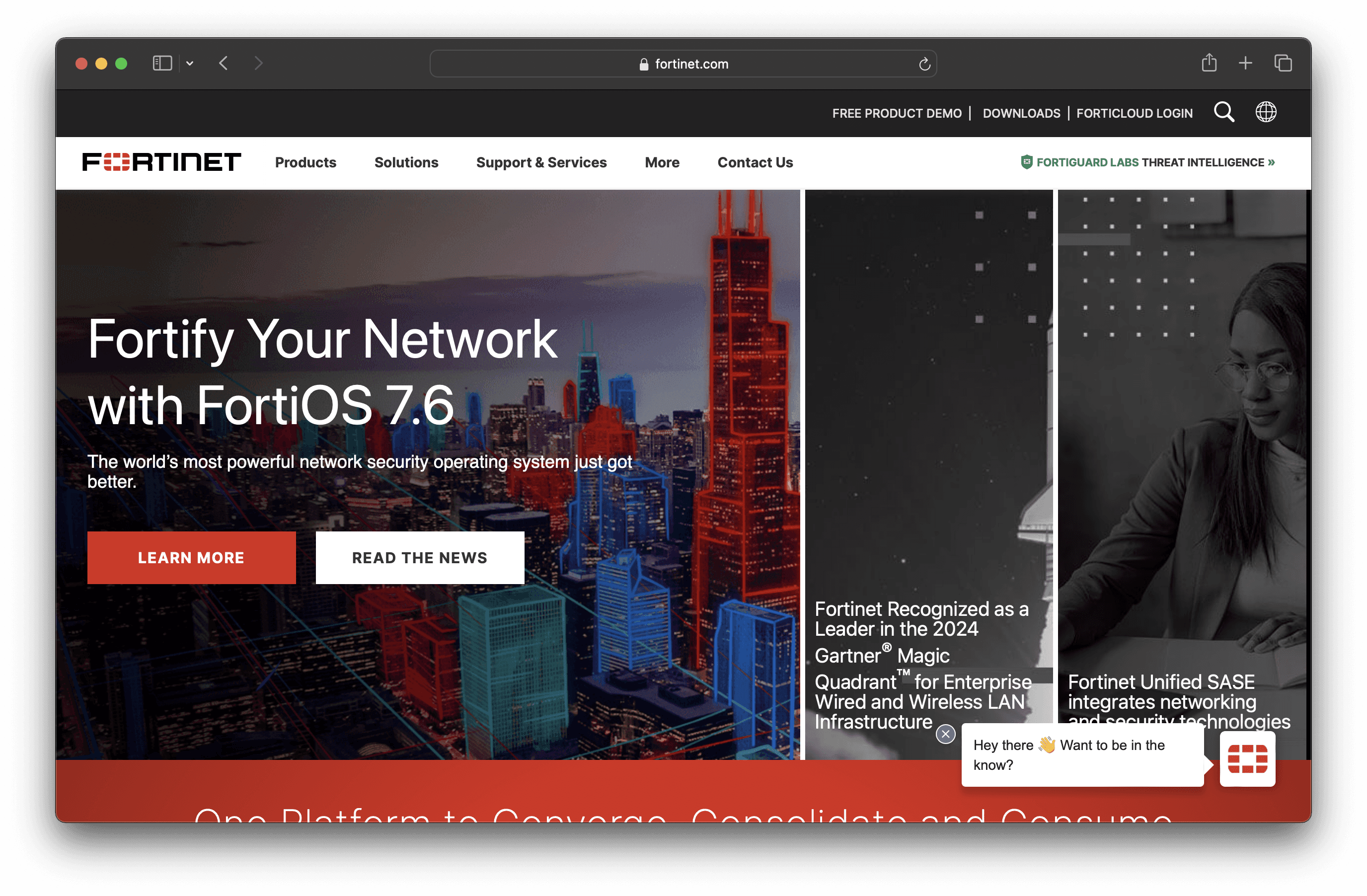
FortiClient is a security solution by Fortinet designed to provide endpoint protection, secure access, and compliance in a single, lightweight client. It integrates with the Fortinet Security Fabric, offering advanced threat detection and automated response, making it ideal for businesses seeking comprehensive and manageable security.
Forticlient Pricing
VPN/ZTNA Edition
EPP/APT Edition
Chromebook Edition
FortiClient Managed Services
FortiClient Forensics Analysis Services
FortiClient Best Practices Service
Forticlient's pricing is not public. Contact their support for more info.
Forticlient Reviews
FortiClient has an overall rating of 4.4 out of 5 stars based on 204 reviews. Users appreciate its reliability and ease of use. Check out more of our reviews here!
Pros and Cons of Forticlient
Pros:
Unified Security: Combines secure connectivity, endpoint protection, and advanced capabilities like EDR and XDR into a single agent.
Enhanced Visibility and Control: Provides IT teams with visibility and control over endpoints, reducing costs and complexity.
Automated Threat Detection and Response: Minimizes the need for manual intervention and ensures faster remediation of threats.
Cons:
Complexity for Small Organizations: The extensive features and integrations might be overwhelming for smaller organizations with limited IT resources.
Dependency on Fortinet Ecosystem: Full benefits are realized when integrated with other Fortinet products, which may require additional investment.
Learning Curve: Requires training and expertise to fully utilize advanced features and integrations.
9. Cisco Secure Endpoint
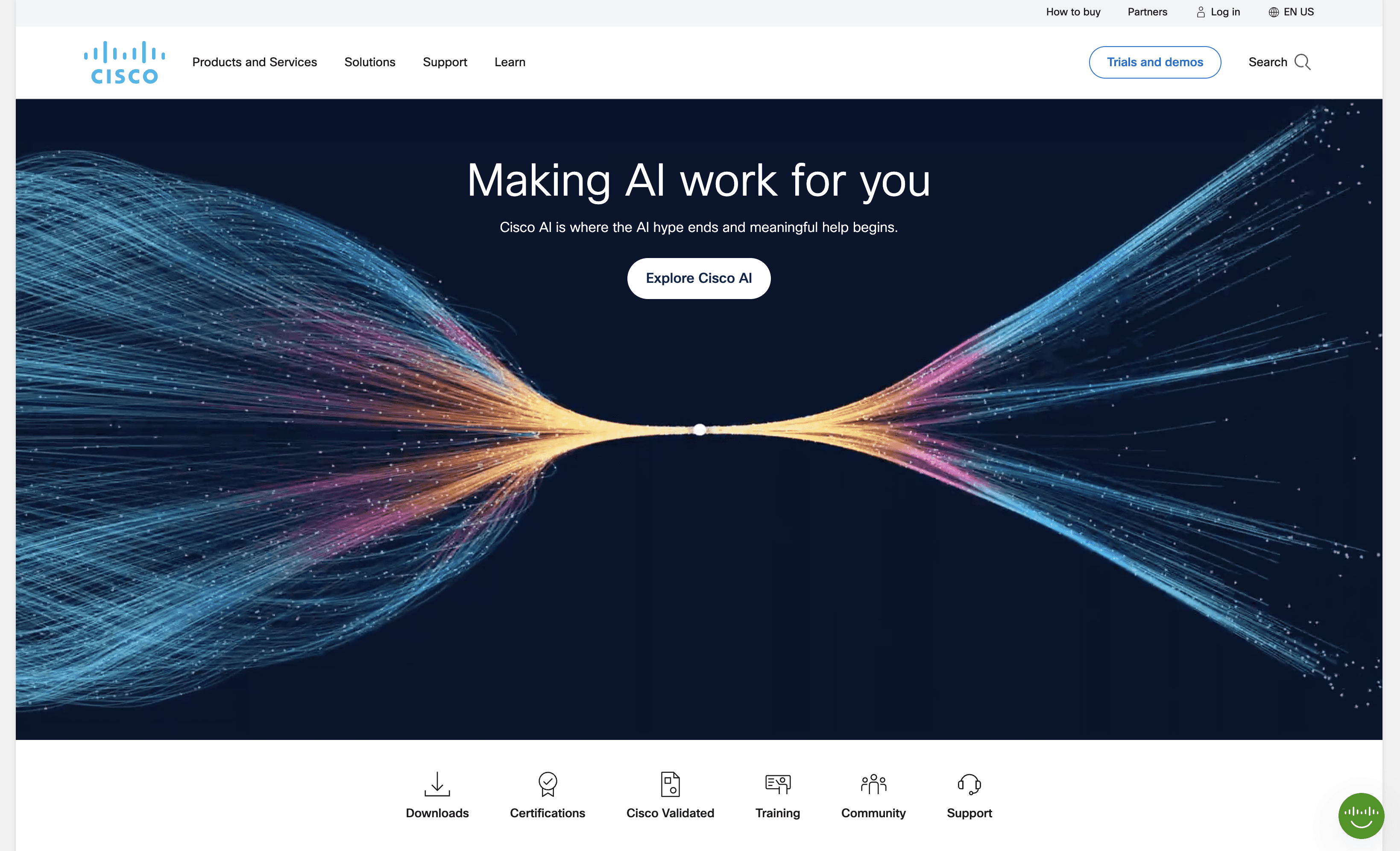
Cisco Secure Endpoint is a cloud-native solution designed to provide advanced endpoint security. It focuses on early threat detection, streamlined investigations, and automated responses, reducing remediation times significantly. Ideal for businesses of all sizes, it integrates seamlessly with existing infrastructure for comprehensive protection.
Cisco Secure Endpoint Pricing
Cisco Secure Endpoint's pricing is not public. Contact their support for more info.
Cisco Secure Endpoint Reviews
Cisco Secure Endpoint has an overall rating of 4.5 out of 5 stars based on 21 reviews. Users appreciate its ease of use and fast threat detection. Check out more of our reviews here!
Pros and Cons of Cisco Secure Endpoint
Pros:
Powerful EDR Capabilities: Built-in endpoint detection and response (EDR) and threat hunting enhance security.
Streamlined Investigations: Orbital Advanced Search reduces time spent on complex investigations.
Integrated XDR Capabilities: Unified view and automated playbooks simplify incident management.
Cons:
Complexity: Advanced features and integrations may be challenging for some users to manage.
Cost: Higher price tag might be a barrier for smaller organizations.
Learning Curve: Significant training required to utilize EDR, XDR, and threat hunting effectively.
10. Carbon Black
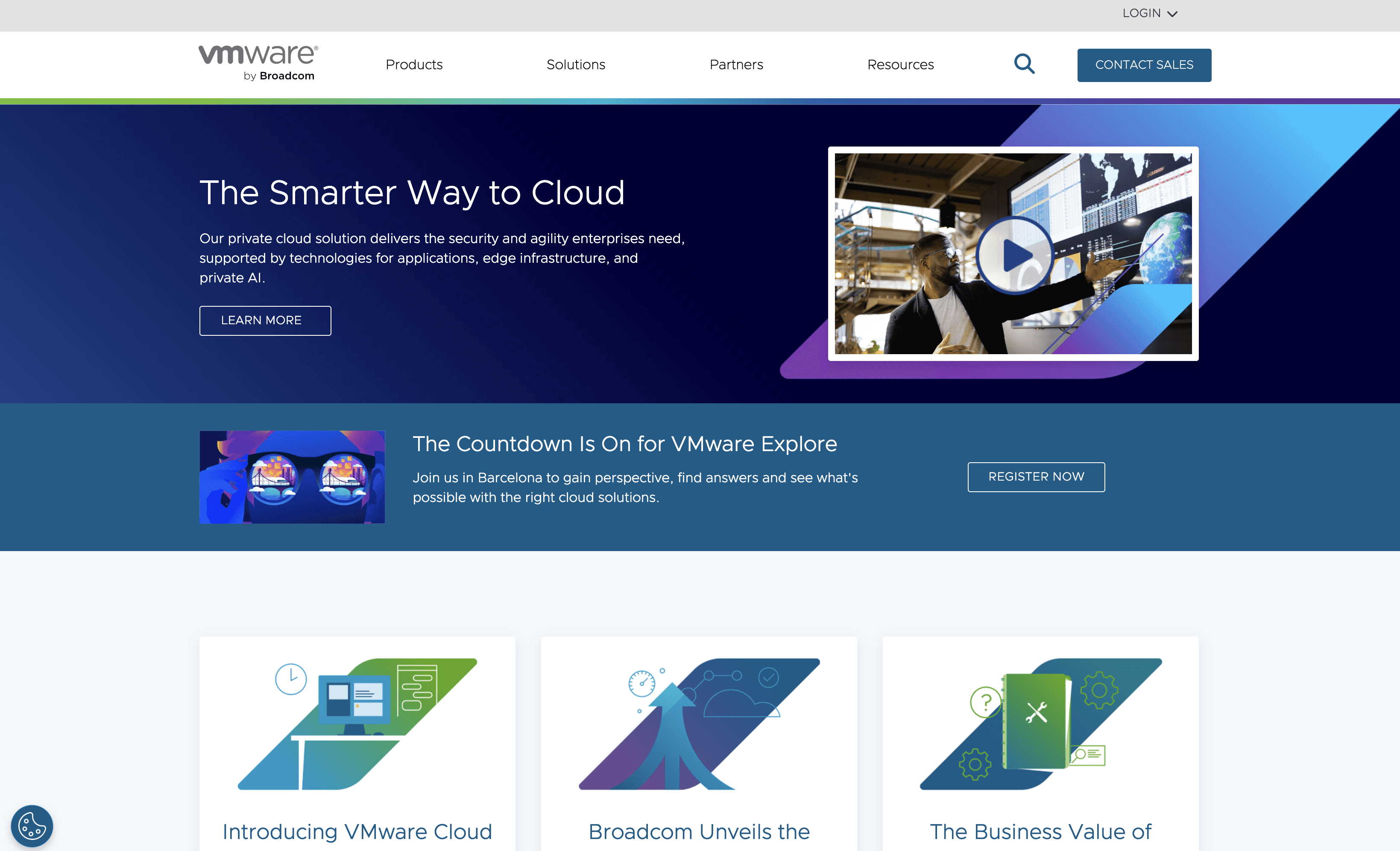
Carbon Black is an endpoint security solution designed to protect against advanced threats. It offers real-time threat detection, prevention, and response capabilities, making it ideal for businesses of all sizes. With a focus on ease of use and integration, Carbon Black aims to provide comprehensive and manageable security.
Carbon Black Pricing
Carbon Black's pricing is not public. Contact their support for more info.
Carbon Black Reviews
Carbon Black has an overall rating of 4.3 out of 5 stars based on 37 reviews. Users appreciate its ease of installation and robust protection. Check out more of our reviews here!
Pros and Cons of Carbon Black
Pros:
Robust Cybersecurity: Carbon Black offers strong protection against various cyber threats, ensuring comprehensive security for endpoints.
Easy Installation: The installation process is straightforward and user-friendly, making it accessible for IT teams of all sizes.
Effective Monitoring: Users appreciate its effective monitoring capabilities, which enhance visibility and threat detection.
Cons:
Agent Removal Issues: Users have reported difficulties in removing the agent, which can complicate management.
Complex Installation: Some users find the installation process complex, requiring more time and expertise.
Delay Issues: There are reports of delays in certain functionalities, impacting overall performance.
Looking to secure your technical infrastructure?
Twingate offers granular access controls and deployment automations to protect your VPC environment. By leveraging Zero Trust security tools, Twingate ensures that private resources and internet traffic remain secure in the modern world of work. Try Twingate for Free today!
Rapidly implement a modern Zero Trust network that is more secure and maintainable than VPNs.
The Best 10 Alternatives to Webroot Business Endpoint Protection (+ Pricing & Reviews)
Twingate Team
•
Jul 27, 2024

Webroot Business Endpoint Protection offers advanced machine learning and cloud-based protection for network endpoints such as laptops, desktops, smartphones, tablets, servers, and virtual environments. While it provides robust security features, it might not be the choice for everyone. This article explores the benefits and limitations of endpoint protection solutions.

10 Alternatives to Webroot Business Endpoint Protection
1. Absolute Secure Endpoint

Absolute Secure Endpoint is a security solution designed to protect devices and data for modern, mobile workforces. It offers features like device health monitoring, application self-healing, and risk response, ensuring robust endpoint security and resilience against threats. This solution aims to provide comprehensive protection and maintain operational continuity.
Absolute Secure Endpoint Pricing
Absolute Visibility
Absolute Control
Absolute Resilience
Absolute Secure Endpoint's pricing is not public. Contact their support for more info.
Absolute Secure Endpoint Reviews
Absolute Secure Endpoint has an overall rating of 4.6 out of 5 stars based on 307 reviews. Users praise its ease of use and reliable tracking. Check out more of our reviews here!
Pros and Cons of Absolute Secure Endpoint
Pros:
Comprehensive device tracking allows IT teams to monitor hardware attributes, device leasing, and connection history, ensuring full visibility over the network.
Security posture assessment provides detailed reports on encryption status, anti-malware status, and device usage, enhancing overall security management.
Remote management capabilities enable administrators to freeze devices, delete data, and manage firmware protection, ensuring swift response to potential threats.
Cons:
OS support limitations mean some features are not available on all operating systems, such as Windows 11 SE and Apple M1-based Mac devices.
Advanced features like Application Health Reporting and Accelerated Device Actions are only accessible with higher-tier packages, potentially increasing costs.
Geographical limitations restrict certain services, like the service guarantee for stolen devices, to specific regions, limiting global applicability.
2. Hexnode UEM

Hexnode UEM is a unified endpoint management solution designed to streamline device management and security for businesses. It offers features like device enrollment, policy enforcement, and remote control, making it easy to manage and secure a wide range of devices from a single platform.
Hexnode UEM Pricing
Starter: $1.00 per device/month
Pro: $1.80 per device/month
Enterprise: $2.70 per device/month
Ultimate: $3.60 per device/month
Hexnode UEM Reviews
Hexnode UEM has an overall rating of 4.6 out of 5 stars based on 189 reviews. Users appreciate its ease of use and multiplatform support. Check out more of our reviews here!
Pros and Cons ofHexnode UEM
Pros:
Comprehensive Device Management: Supports multiple platforms including Windows, macOS, Android, iOS, tvOS, and Fire OS.
Security Features: Includes enterprise-grade security policies, BitLocker management, password rules, and more.
Ease of Use: Intuitive interface simplifies device management and policy enforcement for IT teams.
Cons:
Missing Features: Some advanced features are not available, limiting functionality for certain use cases.
Device Management Issues: Occasional glitches in device enrollment and policy application.
Expensive: Higher-tier packages can be costly, especially for small businesses.
3. WatchGuard Endpoint Security

WatchGuard Endpoint Security is a comprehensive solution designed to protect devices against advanced cyber threats. It integrates next-gen antivirus, Endpoint Detection and Response (EDR), and DNS filtering into a unified platform. With cloud-based management, it simplifies security operations and enhances protection for businesses of all sizes.
WatchGuard Endpoint Security Pricing
WatchGuard Endpoint Security's pricing is not public. Contact their support for more info.
WatchGuard Endpoint Security Reviews
WatchGuard Endpoint Security has an overall rating of 4.4 out of 5 stars based on 115 reviews. Users appreciate its comprehensive protection and ease of use. Check out more of our reviews here!
Pros and Cons of WatchGuard Endpoint Security
Pros:
Comprehensive Protection: Integrates next-gen antivirus, EDR, and DNS filtering for robust defense against advanced threats.
Unified Security Platform: Centralized management and operational automation enhance visibility and streamline security operations.
Advanced Threat Detection: Effectively detects sophisticated threats like fileless malware, APTs, and ransomware.
Cons:
Complexity: The integrated platform may require a steep learning curve for new users.
Dependency on Cloud: Heavy reliance on cloud-based management can be limiting for organizations with strict data residency requirements.
Cost: Advanced features and comprehensive protection might come at a higher cost compared to simpler solutions.
4. F-Secure Elements

F-Secure Elements is a cloud-native, AI-powered endpoint protection solution designed to secure various devices, including computers, servers, and mobile devices. It offers automated patch management, multi-engine malware protection, and cloud-based threat analysis, ensuring comprehensive security with minimal management overhead.
F-Secure Elements Pricing
F-Secure Elements's pricing is not public. Contact their support for more info.
F-Secure Elements Reviews
F-Secure Elements has an overall rating of 4.4 out of 5 stars based on 17 reviews. Users appreciate its effective threat detection and user-friendly interface. Check out more of our reviews here!
Pros and Cons of F-Secure Elements
Pros:
Automated Patch Management: Blocks up to 80% of ransomware attacks, reducing vulnerability.
Cloud-based Threat Analysis: Provides advanced detection and analysis, enhancing security.
Multi-engine Malware Protection: Offers robust defense against various malware types.
Cons:
Complex Interface: May be challenging for new users to navigate and utilize effectively.
Premium Features: Advanced options like DataGuard and Endpoint Encryption require additional costs.
Dependence on Cloud: Requires a reliable internet connection for optimal performance.
5. Sophos Intercept X Endpoint Protection

Sophos Intercept X Endpoint Protection is a security solution designed to prevent breaches, ransomware, and data loss. It combines advanced threat detection with easy deployment and management through a cloud-based platform. Ideal for businesses of all sizes, it offers robust protection with minimal setup and maintenance.
Sophos Intercept X Endpoint Protection Pricing
Advanced
Advanced with XDR
Advanced with MDR Complete
Sophos Intercept X Endpoint Protection's pricing is not public. Contact their support for more info.
Sophos Intercept X Endpoint Protection Reviews
Sophos Intercept X Endpoint Protection has an overall rating of 3.9 out of 5 stars based on 30 reviews. Users appreciate its effectiveness against ransomware and ease of use. Check out more of our reviews here!
Pros and Cons of Sophos Intercept X Endpoint Protection
Pros:
Comprehensive Security: Uses AI, behavioral analysis, and anti-ransomware technologies for robust protection.
Ease of Use: Users find it easy to install and navigate, simplifying management.
Effective Against Ransomware: CryptoGuard technology provides real-time protection and automatic rollback of affected files.
Cons:
False Positives: Occasionally flags legitimate applications, causing unnecessary alerts.
Resource Intensive: AI and behavioral analysis can impact performance on older devices.
Learning Curve: Advanced features may require time to master for new administrators.
6. Eset Endpoint Protection Advanced

Eset Endpoint Protection Advanced is a multi-layered security solution designed to protect business networks. It includes features like firewall, antispam, and web filtering, ensuring comprehensive protection for endpoints. With easy deployment and centralized management, it offers robust security for both physical and virtual environments.
Eset Endpoint Protection Advanced Pricing
ESET Endpoint Protection Advanced's pricing is not public. Contact their support for more info.
Eset Endpoint Protection Advanced Reviews
Eset Endpoint Protection Advanced has an overall rating of 4.6 out of 5 stars based on 814 reviews. Users appreciate its high security and ease of use. Check out more of our reviews here!
Pros and Cons of Eset Endpoint Protection Advanced
Pros:
Multi-layered security including firewall, antispam, and web filtering ensures comprehensive protection against diverse threats.
Real-time protection for mobile devices (Android and iOS) enhances security for on-the-go employees.
Centralized remote management simplifies oversight and control of various endpoints from a single platform.
Cons:
Some users report a steep learning curve, making it challenging for new administrators to master advanced features.
Compatibility issues with certain operating systems can limit the effectiveness of the solution in diverse IT environments.
Performance may slow down on older devices, impacting overall user experience and productivity.
7. Threatlocker

ThreatLocker is a cybersecurity solution focused on Zero Trust endpoint protection. It allows only necessary software to run, blocking everything else, including ransomware. With features like Allowlisting, Ringfencing™, and Network Control, ThreatLocker aims to provide robust security while being easy to manage and deploy.
Threatlocker Pricing
Threatlocker's pricing is not public. Contact their support for more info.
Threatlocker Reviews
Threatlocker has an overall rating of 4.8 out of 5 stars based on 162 reviews. Users appreciate its ease of use and strong security features. Check out more of our reviews here!
Pros and Cons of Threatlocker
Pros:
Zero Trust Security: Blocks all applications and scripts except those explicitly allowed, ensuring robust endpoint protection.
Comprehensive Features: Includes Allowlisting, Ringfencing™, Network Control, and more, offering a wide range of security tools.
24/7 Support: The Cyber Hero Team provides round-the-clock technical support, ensuring quick resolution of issues.
Cons:
Complexity: The platform's extensive features can be overwhelming for smaller organizations or those without dedicated IT staff.
Cost: Enterprise-level solutions like ThreatLocker often come with a higher price tag, which might be a barrier for smaller businesses.
Learning Curve: Implementing a Zero Trust model and utilizing all features effectively may require significant time and training.
8. Forticlient

FortiClient is a security solution by Fortinet designed to provide endpoint protection, secure access, and compliance in a single, lightweight client. It integrates with the Fortinet Security Fabric, offering advanced threat detection and automated response, making it ideal for businesses seeking comprehensive and manageable security.
Forticlient Pricing
VPN/ZTNA Edition
EPP/APT Edition
Chromebook Edition
FortiClient Managed Services
FortiClient Forensics Analysis Services
FortiClient Best Practices Service
Forticlient's pricing is not public. Contact their support for more info.
Forticlient Reviews
FortiClient has an overall rating of 4.4 out of 5 stars based on 204 reviews. Users appreciate its reliability and ease of use. Check out more of our reviews here!
Pros and Cons of Forticlient
Pros:
Unified Security: Combines secure connectivity, endpoint protection, and advanced capabilities like EDR and XDR into a single agent.
Enhanced Visibility and Control: Provides IT teams with visibility and control over endpoints, reducing costs and complexity.
Automated Threat Detection and Response: Minimizes the need for manual intervention and ensures faster remediation of threats.
Cons:
Complexity for Small Organizations: The extensive features and integrations might be overwhelming for smaller organizations with limited IT resources.
Dependency on Fortinet Ecosystem: Full benefits are realized when integrated with other Fortinet products, which may require additional investment.
Learning Curve: Requires training and expertise to fully utilize advanced features and integrations.
9. Cisco Secure Endpoint

Cisco Secure Endpoint is a cloud-native solution designed to provide advanced endpoint security. It focuses on early threat detection, streamlined investigations, and automated responses, reducing remediation times significantly. Ideal for businesses of all sizes, it integrates seamlessly with existing infrastructure for comprehensive protection.
Cisco Secure Endpoint Pricing
Cisco Secure Endpoint's pricing is not public. Contact their support for more info.
Cisco Secure Endpoint Reviews
Cisco Secure Endpoint has an overall rating of 4.5 out of 5 stars based on 21 reviews. Users appreciate its ease of use and fast threat detection. Check out more of our reviews here!
Pros and Cons of Cisco Secure Endpoint
Pros:
Powerful EDR Capabilities: Built-in endpoint detection and response (EDR) and threat hunting enhance security.
Streamlined Investigations: Orbital Advanced Search reduces time spent on complex investigations.
Integrated XDR Capabilities: Unified view and automated playbooks simplify incident management.
Cons:
Complexity: Advanced features and integrations may be challenging for some users to manage.
Cost: Higher price tag might be a barrier for smaller organizations.
Learning Curve: Significant training required to utilize EDR, XDR, and threat hunting effectively.
10. Carbon Black

Carbon Black is an endpoint security solution designed to protect against advanced threats. It offers real-time threat detection, prevention, and response capabilities, making it ideal for businesses of all sizes. With a focus on ease of use and integration, Carbon Black aims to provide comprehensive and manageable security.
Carbon Black Pricing
Carbon Black's pricing is not public. Contact their support for more info.
Carbon Black Reviews
Carbon Black has an overall rating of 4.3 out of 5 stars based on 37 reviews. Users appreciate its ease of installation and robust protection. Check out more of our reviews here!
Pros and Cons of Carbon Black
Pros:
Robust Cybersecurity: Carbon Black offers strong protection against various cyber threats, ensuring comprehensive security for endpoints.
Easy Installation: The installation process is straightforward and user-friendly, making it accessible for IT teams of all sizes.
Effective Monitoring: Users appreciate its effective monitoring capabilities, which enhance visibility and threat detection.
Cons:
Agent Removal Issues: Users have reported difficulties in removing the agent, which can complicate management.
Complex Installation: Some users find the installation process complex, requiring more time and expertise.
Delay Issues: There are reports of delays in certain functionalities, impacting overall performance.
Looking to secure your technical infrastructure?
Twingate offers granular access controls and deployment automations to protect your VPC environment. By leveraging Zero Trust security tools, Twingate ensures that private resources and internet traffic remain secure in the modern world of work. Try Twingate for Free today!
Rapidly implement a modern Zero Trust network that is more secure and maintainable than VPNs.
The Best 10 Alternatives to Webroot Business Endpoint Protection (+ Pricing & Reviews)
Twingate Team
•
Jul 27, 2024

Webroot Business Endpoint Protection offers advanced machine learning and cloud-based protection for network endpoints such as laptops, desktops, smartphones, tablets, servers, and virtual environments. While it provides robust security features, it might not be the choice for everyone. This article explores the benefits and limitations of endpoint protection solutions.

10 Alternatives to Webroot Business Endpoint Protection
1. Absolute Secure Endpoint

Absolute Secure Endpoint is a security solution designed to protect devices and data for modern, mobile workforces. It offers features like device health monitoring, application self-healing, and risk response, ensuring robust endpoint security and resilience against threats. This solution aims to provide comprehensive protection and maintain operational continuity.
Absolute Secure Endpoint Pricing
Absolute Visibility
Absolute Control
Absolute Resilience
Absolute Secure Endpoint's pricing is not public. Contact their support for more info.
Absolute Secure Endpoint Reviews
Absolute Secure Endpoint has an overall rating of 4.6 out of 5 stars based on 307 reviews. Users praise its ease of use and reliable tracking. Check out more of our reviews here!
Pros and Cons of Absolute Secure Endpoint
Pros:
Comprehensive device tracking allows IT teams to monitor hardware attributes, device leasing, and connection history, ensuring full visibility over the network.
Security posture assessment provides detailed reports on encryption status, anti-malware status, and device usage, enhancing overall security management.
Remote management capabilities enable administrators to freeze devices, delete data, and manage firmware protection, ensuring swift response to potential threats.
Cons:
OS support limitations mean some features are not available on all operating systems, such as Windows 11 SE and Apple M1-based Mac devices.
Advanced features like Application Health Reporting and Accelerated Device Actions are only accessible with higher-tier packages, potentially increasing costs.
Geographical limitations restrict certain services, like the service guarantee for stolen devices, to specific regions, limiting global applicability.
2. Hexnode UEM

Hexnode UEM is a unified endpoint management solution designed to streamline device management and security for businesses. It offers features like device enrollment, policy enforcement, and remote control, making it easy to manage and secure a wide range of devices from a single platform.
Hexnode UEM Pricing
Starter: $1.00 per device/month
Pro: $1.80 per device/month
Enterprise: $2.70 per device/month
Ultimate: $3.60 per device/month
Hexnode UEM Reviews
Hexnode UEM has an overall rating of 4.6 out of 5 stars based on 189 reviews. Users appreciate its ease of use and multiplatform support. Check out more of our reviews here!
Pros and Cons ofHexnode UEM
Pros:
Comprehensive Device Management: Supports multiple platforms including Windows, macOS, Android, iOS, tvOS, and Fire OS.
Security Features: Includes enterprise-grade security policies, BitLocker management, password rules, and more.
Ease of Use: Intuitive interface simplifies device management and policy enforcement for IT teams.
Cons:
Missing Features: Some advanced features are not available, limiting functionality for certain use cases.
Device Management Issues: Occasional glitches in device enrollment and policy application.
Expensive: Higher-tier packages can be costly, especially for small businesses.
3. WatchGuard Endpoint Security

WatchGuard Endpoint Security is a comprehensive solution designed to protect devices against advanced cyber threats. It integrates next-gen antivirus, Endpoint Detection and Response (EDR), and DNS filtering into a unified platform. With cloud-based management, it simplifies security operations and enhances protection for businesses of all sizes.
WatchGuard Endpoint Security Pricing
WatchGuard Endpoint Security's pricing is not public. Contact their support for more info.
WatchGuard Endpoint Security Reviews
WatchGuard Endpoint Security has an overall rating of 4.4 out of 5 stars based on 115 reviews. Users appreciate its comprehensive protection and ease of use. Check out more of our reviews here!
Pros and Cons of WatchGuard Endpoint Security
Pros:
Comprehensive Protection: Integrates next-gen antivirus, EDR, and DNS filtering for robust defense against advanced threats.
Unified Security Platform: Centralized management and operational automation enhance visibility and streamline security operations.
Advanced Threat Detection: Effectively detects sophisticated threats like fileless malware, APTs, and ransomware.
Cons:
Complexity: The integrated platform may require a steep learning curve for new users.
Dependency on Cloud: Heavy reliance on cloud-based management can be limiting for organizations with strict data residency requirements.
Cost: Advanced features and comprehensive protection might come at a higher cost compared to simpler solutions.
4. F-Secure Elements

F-Secure Elements is a cloud-native, AI-powered endpoint protection solution designed to secure various devices, including computers, servers, and mobile devices. It offers automated patch management, multi-engine malware protection, and cloud-based threat analysis, ensuring comprehensive security with minimal management overhead.
F-Secure Elements Pricing
F-Secure Elements's pricing is not public. Contact their support for more info.
F-Secure Elements Reviews
F-Secure Elements has an overall rating of 4.4 out of 5 stars based on 17 reviews. Users appreciate its effective threat detection and user-friendly interface. Check out more of our reviews here!
Pros and Cons of F-Secure Elements
Pros:
Automated Patch Management: Blocks up to 80% of ransomware attacks, reducing vulnerability.
Cloud-based Threat Analysis: Provides advanced detection and analysis, enhancing security.
Multi-engine Malware Protection: Offers robust defense against various malware types.
Cons:
Complex Interface: May be challenging for new users to navigate and utilize effectively.
Premium Features: Advanced options like DataGuard and Endpoint Encryption require additional costs.
Dependence on Cloud: Requires a reliable internet connection for optimal performance.
5. Sophos Intercept X Endpoint Protection

Sophos Intercept X Endpoint Protection is a security solution designed to prevent breaches, ransomware, and data loss. It combines advanced threat detection with easy deployment and management through a cloud-based platform. Ideal for businesses of all sizes, it offers robust protection with minimal setup and maintenance.
Sophos Intercept X Endpoint Protection Pricing
Advanced
Advanced with XDR
Advanced with MDR Complete
Sophos Intercept X Endpoint Protection's pricing is not public. Contact their support for more info.
Sophos Intercept X Endpoint Protection Reviews
Sophos Intercept X Endpoint Protection has an overall rating of 3.9 out of 5 stars based on 30 reviews. Users appreciate its effectiveness against ransomware and ease of use. Check out more of our reviews here!
Pros and Cons of Sophos Intercept X Endpoint Protection
Pros:
Comprehensive Security: Uses AI, behavioral analysis, and anti-ransomware technologies for robust protection.
Ease of Use: Users find it easy to install and navigate, simplifying management.
Effective Against Ransomware: CryptoGuard technology provides real-time protection and automatic rollback of affected files.
Cons:
False Positives: Occasionally flags legitimate applications, causing unnecessary alerts.
Resource Intensive: AI and behavioral analysis can impact performance on older devices.
Learning Curve: Advanced features may require time to master for new administrators.
6. Eset Endpoint Protection Advanced

Eset Endpoint Protection Advanced is a multi-layered security solution designed to protect business networks. It includes features like firewall, antispam, and web filtering, ensuring comprehensive protection for endpoints. With easy deployment and centralized management, it offers robust security for both physical and virtual environments.
Eset Endpoint Protection Advanced Pricing
ESET Endpoint Protection Advanced's pricing is not public. Contact their support for more info.
Eset Endpoint Protection Advanced Reviews
Eset Endpoint Protection Advanced has an overall rating of 4.6 out of 5 stars based on 814 reviews. Users appreciate its high security and ease of use. Check out more of our reviews here!
Pros and Cons of Eset Endpoint Protection Advanced
Pros:
Multi-layered security including firewall, antispam, and web filtering ensures comprehensive protection against diverse threats.
Real-time protection for mobile devices (Android and iOS) enhances security for on-the-go employees.
Centralized remote management simplifies oversight and control of various endpoints from a single platform.
Cons:
Some users report a steep learning curve, making it challenging for new administrators to master advanced features.
Compatibility issues with certain operating systems can limit the effectiveness of the solution in diverse IT environments.
Performance may slow down on older devices, impacting overall user experience and productivity.
7. Threatlocker

ThreatLocker is a cybersecurity solution focused on Zero Trust endpoint protection. It allows only necessary software to run, blocking everything else, including ransomware. With features like Allowlisting, Ringfencing™, and Network Control, ThreatLocker aims to provide robust security while being easy to manage and deploy.
Threatlocker Pricing
Threatlocker's pricing is not public. Contact their support for more info.
Threatlocker Reviews
Threatlocker has an overall rating of 4.8 out of 5 stars based on 162 reviews. Users appreciate its ease of use and strong security features. Check out more of our reviews here!
Pros and Cons of Threatlocker
Pros:
Zero Trust Security: Blocks all applications and scripts except those explicitly allowed, ensuring robust endpoint protection.
Comprehensive Features: Includes Allowlisting, Ringfencing™, Network Control, and more, offering a wide range of security tools.
24/7 Support: The Cyber Hero Team provides round-the-clock technical support, ensuring quick resolution of issues.
Cons:
Complexity: The platform's extensive features can be overwhelming for smaller organizations or those without dedicated IT staff.
Cost: Enterprise-level solutions like ThreatLocker often come with a higher price tag, which might be a barrier for smaller businesses.
Learning Curve: Implementing a Zero Trust model and utilizing all features effectively may require significant time and training.
8. Forticlient

FortiClient is a security solution by Fortinet designed to provide endpoint protection, secure access, and compliance in a single, lightweight client. It integrates with the Fortinet Security Fabric, offering advanced threat detection and automated response, making it ideal for businesses seeking comprehensive and manageable security.
Forticlient Pricing
VPN/ZTNA Edition
EPP/APT Edition
Chromebook Edition
FortiClient Managed Services
FortiClient Forensics Analysis Services
FortiClient Best Practices Service
Forticlient's pricing is not public. Contact their support for more info.
Forticlient Reviews
FortiClient has an overall rating of 4.4 out of 5 stars based on 204 reviews. Users appreciate its reliability and ease of use. Check out more of our reviews here!
Pros and Cons of Forticlient
Pros:
Unified Security: Combines secure connectivity, endpoint protection, and advanced capabilities like EDR and XDR into a single agent.
Enhanced Visibility and Control: Provides IT teams with visibility and control over endpoints, reducing costs and complexity.
Automated Threat Detection and Response: Minimizes the need for manual intervention and ensures faster remediation of threats.
Cons:
Complexity for Small Organizations: The extensive features and integrations might be overwhelming for smaller organizations with limited IT resources.
Dependency on Fortinet Ecosystem: Full benefits are realized when integrated with other Fortinet products, which may require additional investment.
Learning Curve: Requires training and expertise to fully utilize advanced features and integrations.
9. Cisco Secure Endpoint

Cisco Secure Endpoint is a cloud-native solution designed to provide advanced endpoint security. It focuses on early threat detection, streamlined investigations, and automated responses, reducing remediation times significantly. Ideal for businesses of all sizes, it integrates seamlessly with existing infrastructure for comprehensive protection.
Cisco Secure Endpoint Pricing
Cisco Secure Endpoint's pricing is not public. Contact their support for more info.
Cisco Secure Endpoint Reviews
Cisco Secure Endpoint has an overall rating of 4.5 out of 5 stars based on 21 reviews. Users appreciate its ease of use and fast threat detection. Check out more of our reviews here!
Pros and Cons of Cisco Secure Endpoint
Pros:
Powerful EDR Capabilities: Built-in endpoint detection and response (EDR) and threat hunting enhance security.
Streamlined Investigations: Orbital Advanced Search reduces time spent on complex investigations.
Integrated XDR Capabilities: Unified view and automated playbooks simplify incident management.
Cons:
Complexity: Advanced features and integrations may be challenging for some users to manage.
Cost: Higher price tag might be a barrier for smaller organizations.
Learning Curve: Significant training required to utilize EDR, XDR, and threat hunting effectively.
10. Carbon Black

Carbon Black is an endpoint security solution designed to protect against advanced threats. It offers real-time threat detection, prevention, and response capabilities, making it ideal for businesses of all sizes. With a focus on ease of use and integration, Carbon Black aims to provide comprehensive and manageable security.
Carbon Black Pricing
Carbon Black's pricing is not public. Contact their support for more info.
Carbon Black Reviews
Carbon Black has an overall rating of 4.3 out of 5 stars based on 37 reviews. Users appreciate its ease of installation and robust protection. Check out more of our reviews here!
Pros and Cons of Carbon Black
Pros:
Robust Cybersecurity: Carbon Black offers strong protection against various cyber threats, ensuring comprehensive security for endpoints.
Easy Installation: The installation process is straightforward and user-friendly, making it accessible for IT teams of all sizes.
Effective Monitoring: Users appreciate its effective monitoring capabilities, which enhance visibility and threat detection.
Cons:
Agent Removal Issues: Users have reported difficulties in removing the agent, which can complicate management.
Complex Installation: Some users find the installation process complex, requiring more time and expertise.
Delay Issues: There are reports of delays in certain functionalities, impacting overall performance.
Looking to secure your technical infrastructure?
Twingate offers granular access controls and deployment automations to protect your VPC environment. By leveraging Zero Trust security tools, Twingate ensures that private resources and internet traffic remain secure in the modern world of work. Try Twingate for Free today!
Solutions
Solutions
The VPN replacement your workforce will love.
Solutions